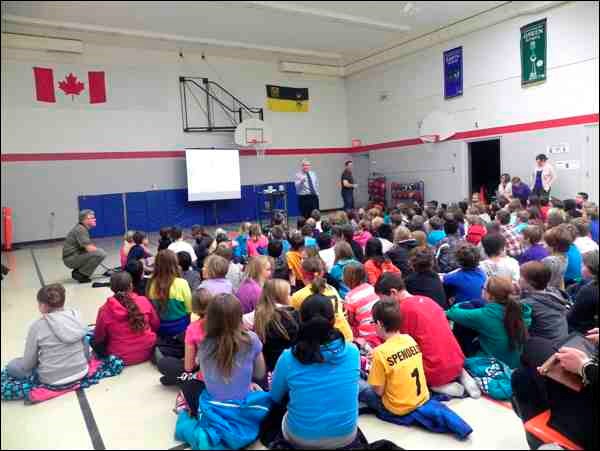In two lunch and learn sessions held Jan. 9 at Unity Composite High School and Jan. 10 at McLurg School in Wilkie, Dr. Alec Couros, a professor of educational technology and media at the University of Regina Faculty of Education, gave some energizing, and encouraging guidance on digital citizenship.
He has given hundreds of workshops and presentations, nationally and internationally, on topics such as openness in education, networked learning, social media in education, digital citizenship and critical media literacy.
Approximately 45 parents attended the session at UCHS. UCHS students also had a chance to attend a session with Dr. Couros to learn more about digital citizenship, and he also made a trip to Unity Public School where St. Peter's students joined them for an afternoon session.
One of the statements that had the biggest impact was "today there is a technology tsunami, you can love it or hate it but we must survive it and make it work for us."
Couros pointed out, "Google is the new business card." Prospective employers or people needing character references or background checks use social media or the web to investigate their subjects. Youth today want to tell about their lives and it's almost like, through social media sites, they are giving a performance. The problem is there is no delete button, and there is no way of getting this back.
Couros reviewed several social media sites stating to parents how they can open a conversation with their kids on etiquette, private versus public information and creating a positive identity. Even though this mass acceleration of technology is frightening to parents, they must be in the arena with their kids in order to monitor and guide them on usage that might affect their future. Information on the web is public by default and private with effort. Couros coached parents on how to help create this positive identity for their kids and themselves.
He said the Internet does not forgive and forget and kids will make errors in judgement, as we all did growing up. But with knowledge comes power and it's important to recognize and use privacy features as well as avoid common mistakes that can cause issues down the road. Pictures or posts on social media sites are easily copied, instantly shared, easily edited and viewable by millions. Kids must know the concept of "what are the risks?" and think of who might see their post other than those who it was intended for. Always act as if you are on Candid Camera, he said. Couros mentioned students are having "camera or device free social activities" or restaurants that offer a 10 per cent discount to those who leave their devices at the door.
The digital revolution changes everyone's lives, Couros explained. He said it's like having communication "super powers" that can allow us vast networking opportunities that were never available before. As we learn in the movies, there is always a dark side to "super powers" when they are channelled in a destructive manner. Kids must recognize or be aware that not everyone may like them or that there are people who will use unfortunate posts or photos to hurt them, he explained.
He described how everything done online leaves remnants of activities on the Internet.
What Courous pointed out, is those footprints can never be erased so we want to be sure they are footsteps in the right direction.




